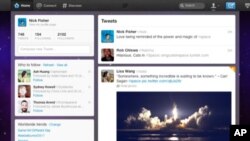Technologists, government workers and activists are trying to find ways to improve the use of so-called crowd-sourced information during times of environmental and political crisis. Many lag far behind what businesses are already doing.
A research fellow with the U.S. Geological Survey, Sophia Liu, has been giving talks at government agencies and policy think tanks, trying to give them a wake-up call on the importance of using information coming through social media.
Monday, her talk was at the Washington-based Woodrow Wilson International Center for Scholars. She said the corporate world has already understood the importance of crowd-sourced information to shape their actions.
"They are profiting off of this," noted Liu. "They are engaging in a lot of strategic marketing efforts of using crowd-sourced data for their profit, so in the emergency management area we really need to get up to speed, we have so much work to do."
She said that generally, the military has been an exception within the government, reacting quickly to and deciphering the importance of information coming through social media.
Misinformation
One common criticism is that it is difficult to gauge the accuracy of the information on websites like the micro-blogging platform Twitter.
Following the devastating 2010 earthquake in Haiti, relief organizations said their responders struggled with many exaggerated or false reports coming through social media, which diverted their aid operations.
Liu brushed off this type of criticism, saying information can also often be wrong when it comes from so-called authoritative sources, such as government agencies or media.
"We are making a lot of assumptions that even authoritative data is correct information, and it is typically not up-to-date or real-time, so there are trade-offs to any kind of information," she said.
Data deluge
The U.S. Geological Survey has recently been using Twitter to both alert people about possible earthquakes as well as immediately monitor users who believe they are detecting an earthquake.
Liu stressed the importance of fine-tuning so-called curation methods, in order to "survive the data deluge" and be able to effectively use the growing quantity of citizen information as it makes itself available.
Juliana Rotich, the co-founder of Ushahidi, a non-profit technology company that specializes in crisis crowd-sourced information, has also been promoting the importance of using this type of data more efficiently.
"It is 2012. A lot of information is real-time," said Rotich. "A lot of citizens are breaking news. It presents an opportunity for us to actually say this is what is going on, and this is how we can prevent it."
Ushahidi came about in the wake of the violence in Kenya in 2007 and 2008 that followed a divisive election. Rotich says she came up with the idea when she noticed there was a gap between what media were reporting and what people in Kenya were experiencing.
Security
At another recent event in Washington, Rotich touched on the importance of protecting the identity of those giving information during a political or security crisis.
She referred to SSL, which stands for Secure Sockets Layer. This encrypts data to obtain confidential user information.
"The first thing we can do is use SSL encryption on the website, which Ushahidi has done. However, that is just only a base on which the activists can build upon," she said. "They posted a practical guide on how to communicate safely using tools like Tor, which is an anonymizing software that enables you to report and for your Internet Protocol address not to be associated with the report that you put in."
But she warned advances in technology and crowd-sourced data only help in dealing with a crisis. She said the most important facets remain having a community, both local and international, to identify and respond to a crisis, and then having the commitment to help those affected.









